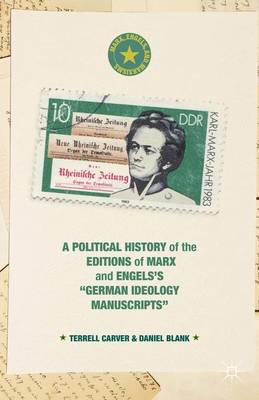Marx, Engels, and Marxisms
4 total works
Marx and Engels's "German ideology" Manuscripts
by Terrell Carver and Daniel Blank
A Political History of the Editions of Marx and Engels's "German ideology Manuscripts"
by Terrell Carver and Daniel Blank
Worldwide political changes since 1990 have driven a re-evaluation of Marxism, a renaissance in Marx-studies, and a renewed interest in his lifelong intellectual partner and personal friend Friedrich Engels. In Terrell Carver's 30th anniversary edition of his pioneering biographical study of the 'junior partner' - which still remains the only one to balance Engels's pre-Marx, with-Marx, and post-Marx writings, giving a rounded view of his life and thought - Carver adopts a comparative and critical approach, neither taking the 'perfect partnership' as a given, nor presuming that all the intellectual fireworks were Marx's. Engels's famously 'bourgeois' class position and 'champagne socialist' lifestyle emerge as resolutions rather than contradictions - they provided opportunities for activist writing and politicking that would not otherwise occur. This study is driven by questions that readers might like to ask about Engels, rather than by the sheer weight of archival materials and stereotypical framing. A newly written introduction provides reflections on how politics since the 1990s has brought Marx, Engels, and Marxisms back to life, and how publication of the Marx-Engels 'collected works' in a definitive edition, and in English translation, have promoted interpretive innovation. Engels himself did his best to establish his own biographical narrative. This book enables readers to assess that dominating view for themselves.
This book examines the life and works of Friedrich Engels during the decade before he entered a political partnership with Karl Marx. It takes a thematic approach in three substantial chapters: Imagination, Observation, and Vocation. Throughout, the reader sees the world from Engels's perspective, not knowing how his story will turn out. This approach reveals the multifaceted and ambitious character of young Friedrich's achievements from age sixteen till just turning twenty-five. At the time that he accepted Marx's invitation to co-author a short political satire, Engels was far better known and much more accomplished. He had published many more articles on far more subjects, in both German and English, than Marx had managed. Moreover, he had written a critique of political economy from a perspective unique in the German context, and published his own pioneering and substantial study of working class conditions in an industrializing economy. Offering an innovative approach to a largely neglected period of Engels's life before meeting Marx, Carver upends standard narratives in existing biographical studies of Engels to reveal him as an important figure not just in relation to his more famous collaborator, but a key voice in the liberal-democratic, constitutional and nation-building revolutionism of the 1830s and 1840s.



